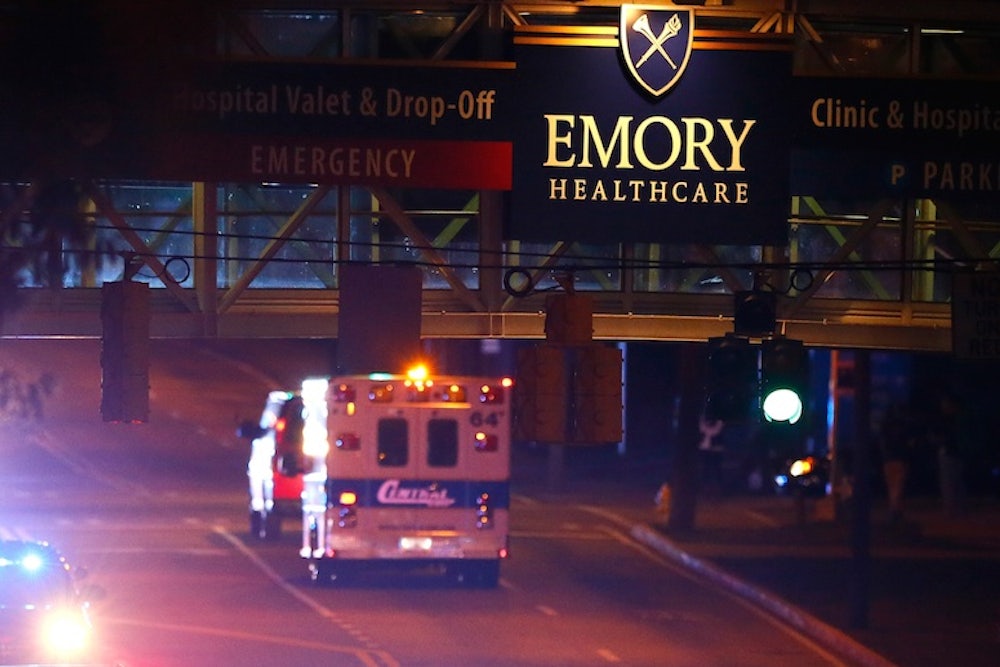Ebola was the big story on Wednesday, with news breaking throughout the day. It started early in the morning, just a little after 5 a.m., when the U.S. Centers for Disease Control sent out a press releasing confirming that a second health worker from Texas Presbyterian Hospital had tested positive. The woman, subsequently identified as Amber Vinson, 29, was among the nurses who had taken care of Thomas Duncan when he was at the hospital.
Later in the morning, the CDC revealed that Vinson had been on a Frontier Airlines flight from Cleveland to Dallas on the day before her diagnosis—and that she’d had a 99.5 degree temperature while on board. In his now-daily press conference, CDC Director Tom Frieden said that Vinson should “not have been on the plane.” But, in the evening, new reports suggested that Vinson had called CDC to see if it was ok to fly with her (very) mild fever. It seems she had received the o.k.—or at least, heard nothing to suggest she should stay on the ground.
And that wasn’t the only story of apparent breakdown within the public health care system. The Associated Press and Dallas Morning News reported on Wednesday that hospital staff had not worn proper gear or used proper procedures during the first two days of Duncan’s admission. During this period, Duncan was extremely ill, and producing large amounts of vomit and diarrhea, making him highly contagious.
Coverage of a developing story can include information that is incomplete or, in some cases, downright inaccurate. Within a few days, or maybe even by the time you’re reading this, new revelations could cast some of this news in a different, less negative light. For the moment, though, it’s hard to escape the conclusion that the public health system failed to perform adequately on multiple occasions. Identifying where those problems occurred and then fixing them ought to be priority number one right now—in Dallas, in Atlanta, and, of course, in Washington, D.C.
Still, it’s good to have some perspective. Vinson is now at Emory University Hospital, one of the four federally designated hospitals with special facilities and trained staff for diseases like Ebola. The first nurse who tested positive, Nina Pham, is still at Texas Presbyterian (as of this writing, anyway) but has been upgraded from “stable” to “good.” If the reports about Duncan’s early days in the hospital are true, more members of his care team are likely to get sick. But experts remain confident that the numbers will never get very big and that Ebola will not become an epidemic here.
Of course, Ebola remains a true crisis somewhere else—in West Africa, where it has already claimed thousands of lives and is likely to kill many thousands more. Maybe the most depressing news of the day was a projection by Liberian officials, which Sarah Kliff wrote about at Vox. At the moment, Liberia has a little less than 5,000 body bags on hand. Officials think they will need another 85,000. The political conversation here on Wednesday was all about what U.S. officials should do to address Ebola stateside, from quarantines to travel bans. That’s understandable. But we should also be talking how to fight Ebola overseas—partly because it’s in America’s self-interest, and partly because it’s the right thing to do.
—Jonathan Cohn
CLIMATE: The best hope for slowing climate change is next year’s international negotiations, culminating with talks in Paris. The goal is to secure an agreement to reduce emissions and, on Tuesday, a top U.S. official hinted at what kind of agreement the U.S. has in mind. (Neela Banerjee, Los Angeles Times)
POT AND POLTICS President Obama plans to appoint Vanita Gupta, a lawyer with the ACLU, to head the Civil Rights Division at the Justice Department. She has endorsed legalization of marijuana, which is a pretty big deal. (Sari Horwitz, Washington Post, Christopher Ingraham, Wonkbook)
OBAMACARE Insurers offering coverage through the new marketplaces have begun sending out notices about automatic renewal, for next year. Consumer advocates worry that many people won't check how prices are changing—and end up paying more than they expected. (Jason Millman, Wonkbook)
Articles worth reading
Is freezing eggs the answer for work-family stress?: As companies like Apple and Facebook begin covering the expense of freezing eggs for their female employees, so that they can delay pregnancy if they so choose, some employees and experts suspect wonder whether this is just another way for corporations to dodge calls for creating a more family-friendly workplace. (Claire Cain Miller, The Upshot)
Least shocking academic research result ever: A new study suggests that white people are more likely to support voter ID laws when they're shown a picture of a black voter than a picture of a white voter. (Dara Lind, Vox)
On Fox News, man bites dog: Watch Shepard Smith scold a colleague for fear-mongering on Ebola. Yeah, we didn't expect to see it, either. (Eddie Scarry, Mediaite)
Pun of the day: Ryan Cooper argues that the Federal Reserve has a "premature extraculation problem" and is reducing its monetary stimulus too early. (The Week)
At QED
Rebecca Leber explains how public health officials would apply quarantines—and why they might think twice before doing so. Danny Vinik says the U.S. economy is OK, even though the Eurozone and major Asian economies are struggling.
